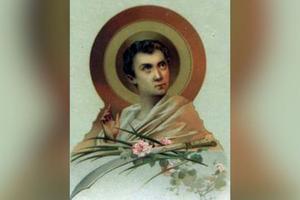‘Angel of Dachau’ Declared Martyr by Pope Francis
On Jan. 21 declaration is the next step in becoming a canonized saint for Father Engelmar Unzeitig.

VATICAN CITY — Father Engelmar Unzeitig, a young priest with Czech roots serving in Germany and Austria, was arrested by the Nazis on April 21, 1941.
His crime? Preaching against the Third Reich from his pulpit, particularly against their treatment of the Jewish people. He encouraged his congregation to be faithful to God and to resist the lies of the Nazi regime.
As punishment, Father Unzeitig was sent to what has been called the “largest monastery in the world”: Dachau concentration camp, which became renowned for the number of ministers and priests within its walls.
The camp housed some 2,700 clergy, roughly 95% of whom were Catholic priests from Poland, making it one of the largest residences for priests in the history of the Church, hence the name.
Father Unzeitig was just 30 years old, and two years ordained, when he was sent to Dachau. Born in Greifendorf, in what is now the Czech Republic, in 1911, Father Unzeitig joined the seminary at the age of 18 and became a priest for the Mariannhill Mission Society, whose motto is: “If no one else will go: I will go!”
While imprisoned at the camp, Father Unzeitig studied Russian in order to be able to help the influx of prisoners from Eastern Europe and had a reputation at the camp as a holy man.
Treatment of the priests and ministers at Dachau was unpredictable: Sometimes they were allowed to worship; at others they were severely treated. On one particular Good Friday, dozens of priests were selected for torture to mark the occasion.
For several years, Father Unzeitig was able to remain in relatively stable health, despite the poor treatment he received. However, when a wave of the often-fatal typhoid fever swept through the camp in 1945, he and 19 other priests volunteered to do what no one else wanted to: care for the sick and dying in the typhoid barracks, an almost-certain death sentence in and of itself. He and his companions spent their days bathing and caring for the sick, praying with them and offering last rites.
Despite his bleak circumstances, Father Unzeitig found his hope and joy in his faith, as evidenced in letters to his sister from the camp:
“Whatever we do, whatever we want, is surely simply the grace that carries us and guides us. God’s almighty grace helps us overcome obstacles. … Love doubles our strength, makes us inventive, makes us feel content and inwardly free. If people would only realize what God has in store for those who love him!” he wrote.
In another letter he wrote:
"Even behind the hardest sacrifices and worst suffering stands God with his fatherly love, who is satisfied with the goodwill of his children and gives them and others happiness."
Eventually, on March 2, 1945, Father Unzeitig succumbed to typhoid fever himself, along with all but two of the other priest volunteers. Dachau was liberated by American soldiers just a few weeks later, on April 29.
In recognition of his heroic virtue, Father Engelmar Unzeitig was declared venerable by Benedict XVI on July 3, 2009.
On Jan. 21, Pope Francis officially acknowledged Father Unzeitig as a martyr, killed in hatred of the faith, which opens the path for his beatification, the next step in becoming a canonized saint.
- Keywords:
- martyrs
- pope francis
- saints and blesseds
- world war ii

















